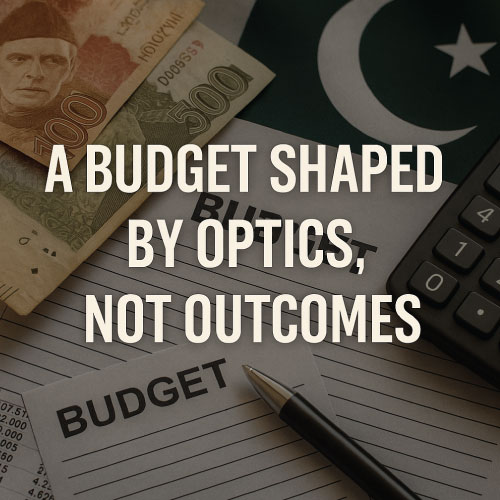When you strip down a country’s budget to its core, it should represent much more than a ledger of numbers. It should be a commitment to priorities, an honest declaration of what matters, and a blueprint of how a state plans to deliver public value. But in Pakistan, the budget is increasingly becoming none of those things. It is not a strategy it is a survival tactic. And that is precisely why we find ourselves stuck in a loop of fiscal crises. As someone who has spent years observing and analyzing Pakistan’s economic policymaking, I often ask: how many times must we repeat the same mistakes before we accept that the system itself is broken?
A Budget Shaped by Optics, Not Outcomes
In Pakistan, the annual budget speech has evolved into a televised performance, rich in applause lines, poor in planning. We announce tax breaks we cannot afford, allocate development funds we cannot disburse, and make promises that die the moment the camera cuts. Behind this stagecraft lies a sobering truth: the budget is no longer a policy tool; it is a political script. Revenue projections are consistently optimistic, almost aspirational. The tax to GDP ratio barely budges, yet we continue to assume unrealistically high collections.
Expenditures, particularly on defense, subsidies, and salaries, are set in stone, while development spending is the first to be axed mid-year. Every fiscal year begins with plans we cannot meet and ends with debts we cannot manage. A 2023 analysis by the International Monetary Fund (IMF) revealed that Pakistan overestimated revenues and underestimated expenditures for six consecutive years. That is not a forecasting error, it is a governance failure.
The Institutional Breakdown
At the root of this problem is a fragile institutional setup. The Finance Division’s Budget Wing lacks capacity, independence, and analytical rigour. It operates in Silos, far removed from line ministries, with little authority to challenge unrealistic proposals. The “call circular” meant to provide clear macroeconomic guidance to ministries, is vague and devoid of medium-term ceilings or priorities. Compare this to India or Sri Lanka, where budget circulars include strategic spending limits, revenue targets, and a fiscal context. Ministries in Pakistan, by contrast, submit wish lists that are rarely interrogated. This is not budgeting, it is bargaining.
The result is a process in which politics dictates policy. Sectoral allocations are often decided by electoral timelines or coalition arithmetic. In election years, we have seen governments approve sweeping salary hikes, launching new infrastructure projects, or expanding subsidies all with no credible financing plan.
The Execution Gap
Even if a budget starts with flawed assumptions, you expect some corrective discipline during execution. Yet that, too, is missing. In practice, supplementary grants have become the government’s primary budget management tool. Originally intended for true emergencies natural disasters, pandemics these grants are now used for routine overspending. In fiscal year 2023, more than 50 per cent of federal spending was revised through supplementary grants. That is not an anomaly, it is a norm. Under Article 84 of the Constitution, the executive can authorize additional expenditure without prior parliamentary approval. And that is exactly what happens frequently and with impunity.
Development spending gets cut mid-year to make room for interest payments and politically driven current expenditures. The result? Crumbling infrastructure, stalled projects, and rising unemployment. All while debt servicing consumes nearly 40 to 60 per cent of total revenues, crowding out future investment.
Where is the Oversight?
This would be less troubling if Parliament played a strong oversight role. Sadly, it does not. Budget debates in the National Assembly are rushed and under-resourced. Members of Parliament often lack access to independent technical advice. Standing Committees, when they meet, rarely challenge core assumptions. The Public Accounts Committee is reactive at best, and follow-through on audit findings is sporadic.
This lack of scrutiny allows the executive enormous leeway to revise spending decisions unilaterally. The misuse of Article 84 is a case in point. In 2023, the Supreme Court had to intervene to ensure funding for elections, a function Parliament should have overseen proactively. When even the judiciary must step in to enforce basic fiscal obligations, the system is clearly out of balance.
The Human Cost of Dysfunction
Numbers can be cold, but the impact of this dysfunction is intense. Budget failures are not just about deficits and debts, they affect lives. Underfunded hospitals, underpaid teachers, poorly equipped police forces, these are the consequences of a budget process that prioritizes optics over outcomes.
Moreover, inflation becomes the hidden tax that punishes the poor. With indirect taxes and utility tariffs rising, the fiscal burden is shifted onto those least able to afford it, while the tax elite remain protected. Without reform, this system will continue to widen inequality and breed disillusionment.
Lessons from Abroad
This is not an unsolvable problem. Countries like Chile, Indonesia, and Ghana have demonstrated that structural fiscal reform is possible even under political constraints. What did they do differently?
- Chile established an Independent Fiscal Council (IFC) to review government projections and ensure compliance with fiscal rules.
- Indonesia introduced a credible medium-term expenditure framework backed by strong parliamentary oversight.
- Ghana, with IMF assistance, rebuilt its budgeting calendar, introduced performance-based budgeting, and empowered its Public Accounts Committee.
Pakistan must learn from these models not just borrow language for reform but implement it.
What Needs to Be Done
Let me offer a clear reform blueprint, grounded in best practices and local realities:
- Strengthen Budget Formulation: Reform the call circular to include realistic macro assumptions and medium-term ceilings. Establish a unified Budget Office with sectoral experts and forecasting tools.
- Control Supplementary Grants: Amend Article 84 to require prior parliamentary approval for all non-emergency allocations. Cap such grants at a fixed percentage of the budget.
- Empower Oversight: Equip parliamentary committees with independent economists and budget analysts. Introduce mandatory pre-budget hearings and ex-ante approval rules.
- Establish a Fiscal Council: Pakistan urgently needs a non-partisan fiscal body to publish independent revenue and expenditure forecasts and monitor adherence to fiscal rules.
- Ensure Transparency: Publish simplified budget summaries, mid-year reviews, and performance-based reports accessible to citizens and media.
- Foster Political Consensus: Without cross-party agreement, reforms will not survive political transitions. A new Fiscal Responsibility Act with bipartisan support is essential.
Final Thoughts
Pakistan’s fiscal woes are not just the result of poor economics they stem from weak institutions, short-term politics, and lack of public accountability. Fixing the budget process is not about pleasing the IMF; it is about restoring the government’s credibility in the eyes of its citizens.
As an economist, I know the technical fixes. But as a columnist and citizen, I understand that trust is the currency Pakistan is fast running out of. Until we treat budgeting as a professional, continuous, and transparent process rather than an annual performance no amount of revenue or aid will save us from fiscal ruin. The budget is the most powerful tool a government has. It is time we treated it that way.
About the Author:
Hasnat Ahmad is a professional economist, columnist, and lecturer with expertise in fiscal policy, institutional reform, and public finance. His research and analysis focus on improving economic governance and transparency in developing countries, particularly Pakistan.

